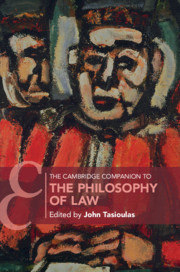Introduction
Published online by Cambridge University Press: 15 June 2020
Summary
Inquiry into the nature of law as a form of social ordering, including the values it ought to serve, threads a long and complex path through the great classics of Western philosophy. Plato’s Republic and Laws, Aristotle’s Nicomachean Ethics and Politics, Cicero’s De Officiis, St Thomas Aquinas’ Summa Theologiae, Thomas Hobbes’ Leviathan, Immanuel Kant’s The Metaphysics of Morals, and G.W.F. Hegel’s The Philosophy of Right, all engage with questions that form part of such an inquiry. But even though many of the chapters in this volume display an acute sensitivity to this history, with some authors explicitly situating themselves in a specific tradition of philosophical thought, they all share a determinedly contemporary focus. The contributors to this volume were not invited to provide overviews of the history of ideas, but rather to identify what they judge to be the key questions for us today, and the most compelling lines of approach to those questions, in relation to topics such as the aims and limits of law; what makes for sound legal adjudication; the scope of justice and the place of human rights; the concepts, institutional structures, and values that unify individual departments of law such as crime, contract, and tort; and the prospects for transnational legal order. This contemporary focus is neither a mere accident nor an instance of sheer parochialism.
- Type
- Chapter
- Information
- The Cambridge Companion to the Philosophy of Law , pp. 1 - 14Publisher: Cambridge University PressPrint publication year: 2020

